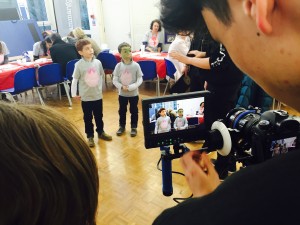
Margot’s brothers, Oscar & Rufus are interviewed at the Crouch End Donor Registration Event last weekend
The words “organ donation” tend to have a shock effect on people, particularly if they haven’t properly considered or thought about it before. The idea of donating ones heart, lungs, eyes and so on is quite emotive and sounds awful, it sends a shiver up the spine, which is illogical given that by the time we’d become organ donors, we wouldn’t be around to experience our donations or feel any pain or discomfort.
Blood donation is much more palatable; we can give our blood and platelets and they replenish themselves with little or no side effects to the donor, so blood and platelet donations can be regular occurrences, which is what happens thanks to the largely anonymous & benevolent 4% of the UK population.
By comparison, joining the stem cell register is “light touch” in that it’s an easy, painless (if you swab or spit) “one time” action to join, after which you may never be asked to actually donate. And if you do happen to be lucky enough to be called upon to actually donate your stem cells or bone marrow (on average there’s a 1 in 1,200 chance), it’s likely to be a one time donation & your stem cells and bone marrow will quickly replenish themselves, with little disruption to your own life.
In this sense, I regard potential stem cell or bone marrow donation as “the gateway” or entry point to other giving. It begets awareness and encourages people to think about other and more regular giving and end of life donations.
All donations like this are intensely personal decisions that each of us needs to arrive at (or not), in our own time & in our own way.
They are an absolute good & are quite likely to save or extend another person’s life.
Which is a wonderful thought for the day.
Husband to Vicki and father to Oscar (2007), Rufus (2008), Digby (2015), Humphrey (2017) & Margot (2012-2014)
Team Margot’s mission
To help save and improve lives by educating, inspiring and motivating people, especially from ethnically diverse communities, to register as blood, organ, stem cell and bone marrow donors and to provide a range of support to families caring for child cancer patients.
Team Margot also provides secretariat support to the All-Party Parliamentary Group for Ethnicity Transplantation and Transfusion.